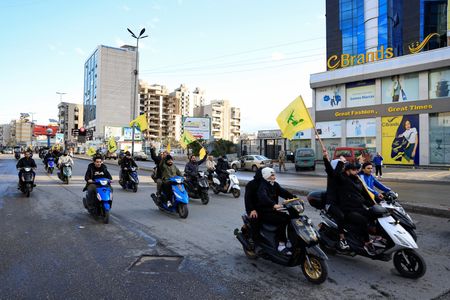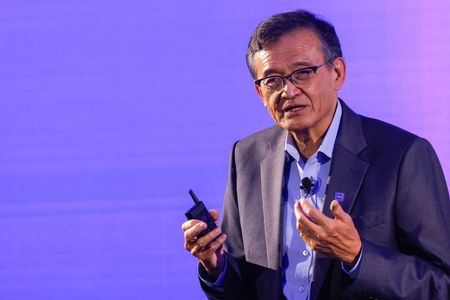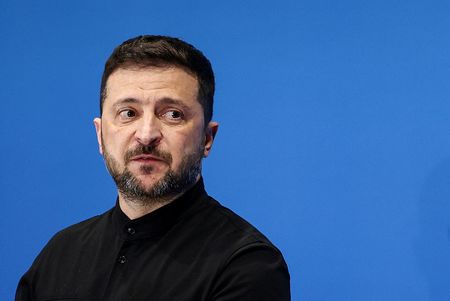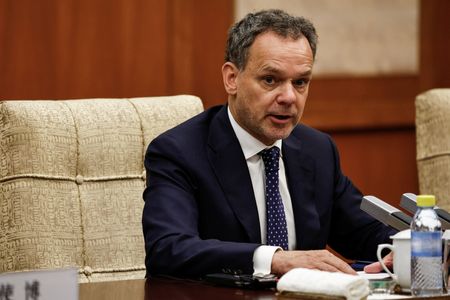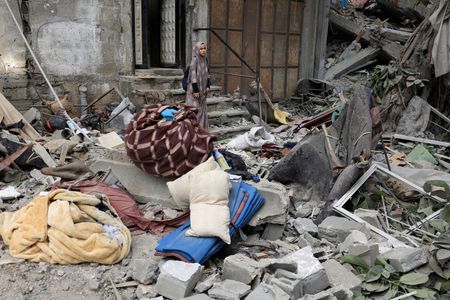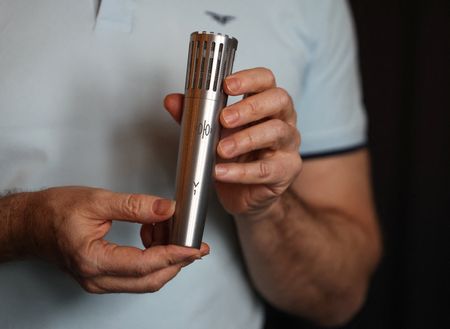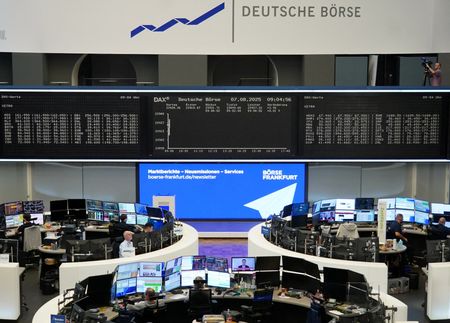(Adds Lebanese information minister quote in paragraph 4, drops ‘Exclusive’ tag from headline)
By Laila Bassam
BEIRUT (Reuters) -The United States has presented Lebanon with a proposal for disarming Hezbollah by the end of the year, along with ending Israel’s military operations in the country and the withdrawal of its troops from five positions in south Lebanon, according to a copy of a Lebanese cabinet agenda reviewed by Reuters.
The plan, submitted by U.S. President Donald Trump’s envoy to the region, Tom Barrack, and being discussed at a Lebanese cabinet meeting on Thursday, sets out the most detailed steps yet for disarming the Iran-backed Hezbollah group, which has rejected mounting calls to disarm since last year’s devastating war with Israel.
Lebanese Information Minister Paul Morcos said following the cabinet meeting on Thursday that the cabinet approved only the objectives of Barrack’s plan but did not discuss it in full.
“We did not delve into the details or components of the U.S. proposal. Our discussion and decision were limited to its objectives,” Morcos said.
The objectives of the U.S. proposal would include phasing out the armed presence of non-state actors including Hezbollah, deploying Lebanese forces to key border and internal areas, ensuring Israel’s withdrawal from the five positions, resolving prisoner issues through indirect talks, and permanently demarcating Lebanon’s borders with Israel and Syria.
The U.S. State Department did not immediately respond to a request for comment.
The Israeli prime minister’s office declined to comment, while the defence ministry did not immediately respond.
Hezbollah had no immediate comment on the proposal, but three political sources told Reuters that ministers from the Iran-backed group and their Muslim Shi’ite allies withdrew from Thursday’s cabinet meeting in protest at discussions of the proposal.
Israel dealt major blows to Hezbollah in an offensive last year, the climax of a conflict that began in October 2023 when the Lebanese group opened fire at Israeli positions at the frontier, declaring support for its militant Palestinian ally Hamas at the start of the Gaza war.
The U.S. proposal aims to “extend and stabilise” a ceasefire agreement between Lebanon and Israel brokered in November.
“The urgency of this proposal is underscored by the increasing number of complaints regarding Israeli violations of the current ceasefire, including airstrikes and cross-border operations, which risk triggering a collapse of the fragile status quo,” it said.
Phase 1 of the plan would require the Beirut government to issue a decree within 15 days committing to Hezbollah’s full disarmament by December 31, 2025. In this phase, Israel would also cease ground, air and sea military operations.
Phase 2 would require Lebanon to begin implementing the disarmament plan within 60 days, with the government approving “a detailed (Lebanese army) deployment plan to support the plan to bring all arms under the authority of the state”. This plan will specify disarmament targets.
During Phase 2, Israel would begin withdrawing from positions it holds in south Lebanon and Lebanese prisoners held by Israel would be released in coordination with the International Committee of the Red Cross (ICRC).
During Phase 3, within 90 days, Israel will withdraw from the final two of the five points it holds, and funding will be secured to initiate rubble removal in Lebanon and infrastructure rehabilitation in preparation for reconstruction.
In Phase 4, within 120 days, Hezbollah’s remaining heavy weapons must be dismantled, including missiles and drones.
In Phase 4, the United States, Saudi Arabia, France, Qatar and other friendly states will organise an economic conference to support the Lebanese economy and reconstruction and to “implement President Trump’s vision for the return of Lebanon as a prosperous and viable country”.
(Reporting by Laila Bassam in Beirut and Humeyra Pamuk in Washington; Additional reporting by Alexander Cornwell, Ahmed Tolba and Yomna Ehab Writing by Tom PerryEditing by Edmund Blair and Frances Kerry)

